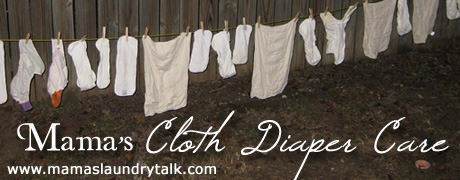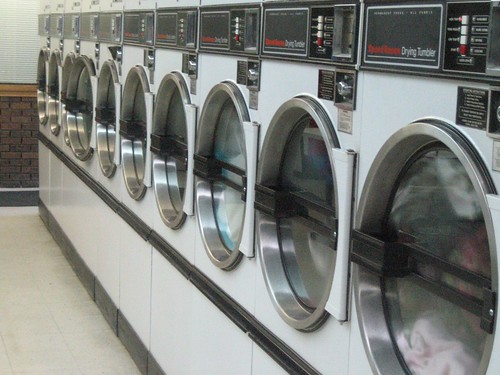I am so thrilled to have Dave from Folkabout Baby guest post here at Mama’s. Dave writes a unique blog and I just love its premise: your baby knows best so learn to listen to him or her. Folkabout Baby is about “saving the world by changing the way we raise our children.” Love it.

Cloth diapers are great. They’re cheaper than disposables, especially if you use them for more than one baby. They make potty training easier, since your child will be able to tell more easily if their diaper is wet. Perhaps best of all, they’re better for the environment, diverting huge amounts of waste from landfills.
What’s not to love?
Well, let’s be polite and call it the “ick factor.” As in, “Ick, what am I supposed to do with this poop-filled diaper?”
This problem is made even worse when you don’t have your own washer and dryer. If you have to schlep your dirty diapers four blocks away to the laundromat, it’s simply not convenient to do a load of laundry every other day.
There are three concerns that you have to address to use cloth diapers when you rely on outside laundry facilities. The first is the smell, since you have to go longer in between laundry loads. Next, you need to figure out how to transport your loads of diapers to the laundromat. Finally, you need to be prepared for the poor performance of public washing machines, since these machines are often old, and were probably never very high quality to begin with.
Putting a Lid on Smell
The best way I’ve found to deal with the smell of a bin of used cloth diapers is one that ramps up the ick factor a few notches, but it’s worth it. If you’re squeamish, it might not be for you, but it yields huge dividends when combating smell, as well as dealing with poor-quality washing machines, as I’ll discuss below.
Quite simply, I pre-wash poop-filled diapers by hand before putting them into the diaper pail. You can use rubber gloves if you want, but I just wash my hands thoroughly afterwards. This pre-wash eliminates most, if not all, of the cause of nasty odors.
Storing the used diapers properly will eliminate any remaining odor the diapers might still have. I use a wet-bag specifically designed for cloth diapers, available at Ottawa Cloth Diapers (not an affiliate link, just a great product).
For a bin, I use a green-waste bin with a hinged lid. These bins are available at most hardware stores, and they’re designed to prevent any odors from escaping. The lid seals quite snugly, and no smell gets out. Trust me, I’m a chef with a very sensitive nose, and I don’t notice a thing when I walk into my baby’s room.
Getting to the Laundromat
The storage method you choose for your diapers should also take ease of transportation into account.
A waterproof bag is a must; without one, you can’t transport the diapers without running the risk of baby poop getting everywhere. Even still, you probably don’t want to risk the bag developing a hole in transit.
Having a system that lets you keep the diaper bag in the bin is best. For instance, the green-waste bin that I use has wheels built-in, which makes it a breeze to bring down to my building’s laundry room.
Keep in mind that you have no choice but to use the dry pail method. Does lugging an extra twenty kilos of nasty water down to the laundromat with you sound appealing? I didn’t think so.
Dealing with Poor Quality Washing Machines
If you’re doing laundry in the laundry room of your building or at a laundromat, you’re stuck using whatever machines are available. As a rule, these machines are rather old, and they’re probably not too efficient. They simply don’t have the options that a high-end washer does, which means you’ll only be able to take advantage of a few of the different tips found here.
This is where pre-washing shines. By dealing with most of the waste matter before the diapers even end up the pail, you put much less of a demand on the washing capabilities of the machine you’re using. Before I started pre-washing, I’d have to run loads two or three times in order to get them clean, but this is no longer an issue for me.
Even if you’re using an ancient clunker of a washing machine, you probably still have a few options open to you. Select the cycle that runs for the longest, which is usually also the hottest temperature setting. This gives your diapers the best chance to get clean. As well, consider using an in-wash booster, such as oxygen bleach, and use a high-quality detergent. This will maximize your chances of getting the diapers clean in one load.
Is It All Worth It?
Absolutely!
Washing cloth diapers when you don’t have your own washer and dryer is certainly more inconvenient, but it still offers you huge benefits over disposable diapers. You’re saving money, you’re preparing your child for potty training, and you’re greatly lightening your impact on the environment.
By pre-washing your diapers and storing them in a bin with a tight-fitting lid, you don’t need to worry about the smell. When you choose a storage system that makes it easy to get your diapers to the laundromat, you don’t have to struggle on laundry day. Finally, by taking into account the limits of the machines you’re using, you can make sure that you get clean diapers every time.
If you’ve been reluctant to switch to cloth diapers because you don’t have your own laundry machines, keep these suggestions in mind, and know that it’s easier than you think. When you decide to make the switch, your wallet will thank you, and you’ll be creating a better future for your child.
Trust me, it’s worth it!
————————————————
Dave Higgs-Vis is a father, a husband, a blogger, and a chef. He writes Folkabout Baby, a blog dedicated to saving the world by changing the way we raise our children. He believes that listening to your baby is the best thing that you can do to improve as a parent.
- 73shares
- Facebook38
- Pinterest23
- Print1
- Twitter0
- Email10




great post…we do have our own washer/dryer, but I choose to wash just once a week now that that our daughter is older and changing diapers somewhat less frequently than the newborn phase. We use a dry pail with a wet bag inside. It’s an old(from my 24 year old brother) hinge-top lid diaper pail. We don’t notice a smell besides when it is open.
And our ancient washer actually does a great job compared to the HE washer my friend has, her’s doesn’t get enough water through them to get the smell out, so the more water probably the better, especially since you aren’t paying for the water at the laundromat. And I like to line dry so that helps with getting the smell out too.
I live in Asia and do not have access to a hot water connection to my washing machine. Not only is my washer old, but it doesn’t use hot water! I also can’t get things here like oxygen bleach. Any suggestions? Thanks!
Rachel –
Hmmm. You’ve got a tough situation there with no hot water and no access to other laundry products. On the up side, you have an old washer which means it uses a ton of water. And lots of water is a good thing when washing dipes.
If it were me, I would wash the load of diapers twice using the longest cycles that the machine offers. Meaning, I would wash on a cycle that says ‘heavy-duty’ or ‘heavy soil’ and if you have a setting for soil level, definitely ensure it is set to ‘heavy.’
And dry in the sun. 😉
-Lauren
When I lived in Japan 30 yrs. ago, I didn’t have hot water hook-ups to my washer, either. However, I did have an on demand water heater mounted to the wall for the bathroom sink (washer was in the same room as sink), so I bought a longer hose to hook onto the water heater and was able to fill the wash cycle by putting the hose into the open washer and filling it and finishing the rinse cycles in cold water. You have to watch and not let it overfill. The other method we used to use was bucketing out the hot water from the bathtub and filling the washer with that…but that was a little back-breaking. I had one in diapers at that time and we had very nice cloth diapers that were easy to wash that could be used inside waterproof velcro tabbed pants.
Ms. Eliis – I must tell you that seems like a hard way to wash clothes and an even harder way to wash diapers. Let me never complain again about washing clothes, because I obviously have it easy!
Thanks so much for sharing your experience. So interesting!
-Lauren
When we moved into our co-operative, we had to use the public laundry facilities. We tried for a couple of months to cloth diaper using the facilities, but the poor quality of the machines were what finally caused us to put away the clothies. Not being able to have that extra rinse is what did it – allowing detergent to build up in our diapers and covers. Not just our own detergent, but the detergent residue left by other co-op members, who used detergents unfriendly to cloth diapers. We were getting major leaks and smells (with pre-washing at home), and had no way to strip the diapers. Our laundry facilities were also uber-competitive, so there was no chance of doing consecutive washes to help with the detergent problem (we’d have to put our wet diapers back in the line for washing.) So we stopped for a while. But then my husband got me a used washing machine for my birthday, and we’re back using cloth again. I’ve noticed a huge difference in the toilet-learning of my 2-year-old since!
Kirsten – Goodness, the co-op sounds like a difficult way to do laundry! Glad you were able to get your own machine. 😉
Thanks for visiting Mama’s-
Lauren
The other method we used to use was bucketing out the hot water from the bathtub and filling the washer with that…but that was a little back-breaking. I had one in diapers at that time and we had very nice cloth diapers that were easy to wash that could be used inside waterproof velcro tabbed pants.
We have a washer/dryer in our 8 unit apartment complex, but we aren’t sure it’s respectful to our neighbors to wash dirty diapers in the washing machine we all share! So, we’re thinking about getting a portable washing machine for our apartment (just for dirty diapers) so that we can avoid using disposable ones. I’ve done some research and they do exist, but since they require 2 hoses (one attached to a faucet/water source and one that drains the water at the end), I’m trying to figure out the solution for this: it would be gross to have the waste water drain into a sink or bathtub, so I guess it would have to drain into the toilet? Or perhaps there are decent ones that don’t require any hoses, and instead we add the water ourselves and dump the waste water ourselves? Any suggestions on portable washing machines you have would be much appreciated!